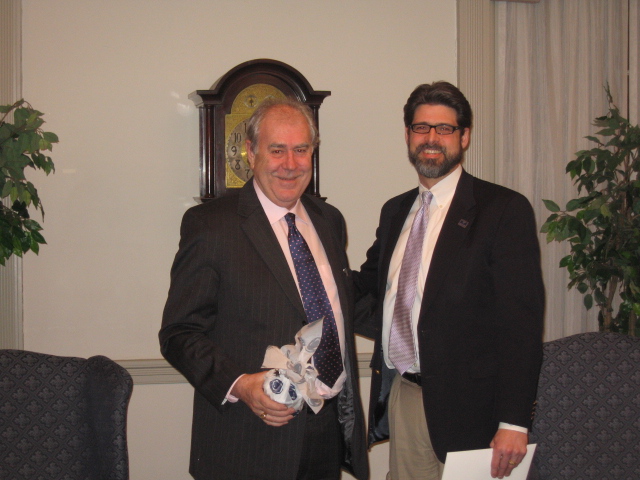Originally posted on my university blog. This is what makes being in a university (and an honors college) so much fun. Meeting folks who have made and been a part of history.
 Tonight we had our inaugural speaker in the Honors Faculty Colloquium Ambassador Richard Butler. Ambassador Butler is Penn State’s Distinguished Scholar of International Peace and Security in the School for International Affairs. You may recall that in addition to being a four-time ambassador for his native Australia Ambassador Butler was the chair of the United Nations Special Commission to disarm Iraq from 1997 until 1999 when he and his 1,000 weapons inspectors were given 24 hours to leave the country by Saddam Hussein’s regime. In addition to his position as Distinguished Scholar at Penn State he remains extremely active in the pursuit of global nuclear disarmament as a member of Global Zero.
Tonight we had our inaugural speaker in the Honors Faculty Colloquium Ambassador Richard Butler. Ambassador Butler is Penn State’s Distinguished Scholar of International Peace and Security in the School for International Affairs. You may recall that in addition to being a four-time ambassador for his native Australia Ambassador Butler was the chair of the United Nations Special Commission to disarm Iraq from 1997 until 1999 when he and his 1,000 weapons inspectors were given 24 hours to leave the country by Saddam Hussein’s regime. In addition to his position as Distinguished Scholar at Penn State he remains extremely active in the pursuit of global nuclear disarmament as a member of Global Zero.
Needless to say (but it is worth pointing out anyway!), this was a tremendous opportunity for our students to hear from a person who has been at the heart of some of the most important events of recent history. In addition to recounting his experience with Tariq Aziz who insisted that he send a positive report back to the UN, he shared a number of stories and insights with our students, often not shying away from revealing his own political convictions. A few highlights:
- The reason no WMDs were found in Iraq, he insisted, was because they had succeeded in disarming Iraq through the UNSCOM program.
- He is confident that similar inspection programs can ensure that Iran abides by their commitment to theNuclear Non-Proliferation Treaty.
- The very existence of nuclear weapons by any country is a tremendous threat to all humanity.
- It is possible to get all nations to draw down their nuclear arsenals and keep other nations from developing them.
- Ultimately instability (and stability) are questions of justice/fairness. When a country or group feels that they are not being treated fairly then they will seek to rectify that situation, feeling justified to take action.
He also offered sound advice to our students.
- They should seek to be “clear eyed” not simply “to think.” That is, to realize that situations are complex and we must think clearly in order to see solutions. (This is what I have often described as “critical thinking” and the goal of all honors education, but specifically that of the Presidential Leadership Academy.)
- There need to be more women going into civil service, state department, and engaging in global issues.
- In considering your chosen field (and interviewing, for example, for a State Department position) know what it is that you would bring to the organization, what sets you apart, what are you passionate about, and know how to communicate that.
As I said, this is just the first of what will be our regular series in the Honors Faculty Colloquium. The next HFC will be held Monday, April 19 in Simmons Piano Lounge at 8:00 p.m. with the two of the producers (and instructors at PSU) of the documentary “Street of our Lady” — Judy Maltz-Schejter and Richie Sherman.
Judy Maltz-Schejter brings an abundance of experience to the classroom as she teaches journalism classes at Penn State. She worked for seven years as chief economic correspondent in Jerusalem for Ha’aretz, Israel’s most respected newspaper, and was one of the founding editors of the Ha’aretz English edition—a joint venture with the International Herald Tribune. She has also worked as a reporter for the Jerusalem Post and Reuters and has written extensively for the Financial Times of London and other British, American and Israeli newspapers. In addition to covering a wide assortment of beats as a news reporter, she has written many feature, magazine and op-ed pieces for various publications around the world.
A screening of the “Street of Four Lady” is being arranged for a time in March. Here’s a link to our Web site: www.streetofourlady.org
Richie Sherman
Richard Sherman teaches intermediate and advanced film production courses. His own work, which emphasizes an expressionistic personal approach to filmmaking, is likely to include hand-processed or digitally manipulated material.
His professional cinematography experience includes three narrative feature films, two feature documentaries and more than 40 shorts. This work has appeared in national and international festivals, been broadcast on such networks as the History Channel and PBS and distributed online through such venues as Film Threat Magazine. In 2007, he earned the Deans’ Excellence Award for Research and Creative Activity from the College of Communications.
He is a past recipient of the Virginia Museum of Fine Arts Artists Fellowship and the Ohio Arts Council Individual Artists Fellowship.



One thought on “Ambassador Richard Butler”
Thanks, Chris, for this post. Butler is a class act and you are fortunate to have him on board.